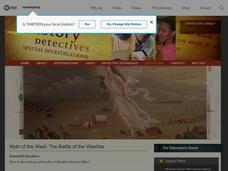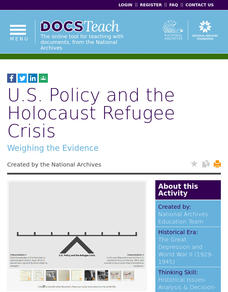US Citizenship and Immigration Services
Thanksgiving 1—Pilgrims and American Indians
The Pilgrims first arrived in America in order to gain religious freedom. Here is a instructional activity that takes the class on this journey with the Pilgrims, stopping to look at how they got here, who they met when they arrived, and...
US Department of Veterans Affairs
Veterans Day
Teaching class members all about the importance and meaning behind Veterans Day with an informative resource. Pupils complete a classroom activity guide and individual research to learn more about the brave men and women who defend the...
Theodore Roosevelt Association
Roosevelt's Legacy: Conservation
The legacy of Theodore Roosevelt carries through modern American politics, economics, foreign policy, and society. But his proudest and most profound efforts were in the world of conservation, and in preserving the natural beauty of...
University of California
Containing Communism Abroad
Learn more about the policy of the United States to contain communism during the Cold War. The fifth installment of an eight-part series looks at primary and secondary materials about a challenging time in history. After analyzing the...
PBS
Myth of the West: The Battle of the Washita
Go West, young man! Scholars use PBS video clips, slide shows, and interactive materials to create a picture of Manifest Destiny in the American West. Using a variety of primary and secondary sources, young historians learn about the...
Curated OER
Meet Hannah the Weaver
Students analyze primary and secondary sources to explore slavery and emancipation, and write letter or diary entry from point of view of slave Hannah Harris or plantation owner Robert Carter. Students then dramatize their creative...
Alabama Department of Archives and History
A College Student's Perspective on WWI
Some things remain the same, such as the world being on the brink of war, or college attendees writing home requesting money. As part of their research into events that led up to President Wilson's declaration of war on Germany, class...
Our White House
The Our White House Inauguration Celebration Kit for Kids!
Get the youngest American citizens involved in the presidential election and inauguration with a set of social studies activities. Focusing on the history of presidential inauguration ceremonies, learners draft their own poems, design...
Carolina K-12
Group Project: Freedom Parade
Parades are a great way to celebrate. Get young historians into the festivities by asking them to create an informational float for a Freedom Parade. Picking a topic from the provided list or suggesting one of their own, class members...
Benjamin Franklin Tercentenary
Ingenious: Franklin Assembles a Scientific Community
Few Americans have heard of the burgeoning scientific community known as the America Philosophical society, started by none other than Benjamin Franklin. With inquiry, research, and discussion, high schoolers come to understand their...
National Endowment for the Humanities
The "To Do List" of the Continental Congress
What is on your to-do list today? The second lesson plan of a three-part series on Lost Heroes of America investigates the laundry list of items in front of the second Continental Congress. Scholars research, analyze, and present...
Baylor College
Microbes and Disease
Discuss how diseases have impacted human history. Divide your class into groups and assign each group one of the following: tuberculosis, malaria, plague, cholera, smallpox, and AIDS. They read up on, complete a concept map, and present...
Smithsonian Institution
Native Resistance: Native Resistance Then and Now
Native Americans lost so much—and gained so little in return. Scholars explore Native Americans' resistance to the United States government. The lesson plan uses primary sources to explore the different forms of protest and gives a voice...
National Endowment for the Humanities
Who Were the Foremothers of the Women's Suffrage and Equality Movements?
Young scholars complete a unit of lessons on the women who contributed to the early Women's Rights Movement in the U.S. They conduct Internet research, examine images online, develop a list of women, complete a worksheet, and create a...
City University of New York
Urban Politics: Machines and Reformers
Take a trip to the turn of the twentieth century with a resource about industrialism in America. With primary source documents and focus questions, learners think about the ways that government groups and organizations paved the way for...
Mississippi Whole School Initiative
Dream Big...With Your Eyes Wide Open
For many people, Barack Obama's presidency was the next step in Martin Luther King, Jr's dream of America's future. Explore the dreams of Americans past and present, as well as the young Americans in your class, with a set of activities...
Sea World
Endangered Species
Study different endangered species with several activities that incorporate math, science, language arts, and research strategies. A great addition to your lesson on conservation or Earth Day.
National History Day
Challenging the Status Quo: Women in the World War I Military
Why are some so resistant to change? The status quo is often to blame for a lack of forward movement in society. Following the events of World War I, women in America suddenly had a voice—and were going to use it. Scholars use the second...
DocsTeach
The School Lunch Program and the Federal Government
The school lunch program is rooted in the struggles of the Great Depression and is still assisting families today. Academics research documents and images relating to the creation of the school lunch program. Scholars use a worksheet to...
DocsTeach
Where Was the New Deal?
Young historians delve into the origin of federal social programs to understand the impact of the New Deal. An informative activity explores some of the New Deal programs, such as the Civilian Conservation Corp, using historical...
Gilder Lehrman Institute of American History
Harriet Beecher Stowe Sends Uncle Tom’s Cabin to Victoria and Albert, 1852
Harriet Beecher Stowe's plea for abolition is not only laid plain in her acclaimed novel, Uncle Tom's Cabin, but in her written correspondence as well. High schoolers read a letter written by Stowe to Prince Albert and Queen Victoria to...
University of California
The Civil War: Lincoln’s Speeches
Abraham Lincoln is responsible for uniting the states during the most tumultuous periods in American history, and for his elegant oratory that kept the Union believing in its cause. Young histoians analyze various speeches by America's...
California State University
Life in the Missions of California
Academics explore the topic of life in California Missions for Native Americas. Class members complete a research activity, respond to writing prompts, and engage in hands-on-activities to learn who lived in the missions and what life...
DocsTeach
U.S. Policy and the Holocaust Refugee Crisis
How did the United States respond to the Holocaust refugee crisis during World War II? The activity focuses on the United States' foreign policies and the arguments for and against offering assistance. Scholars analyze historical...

























